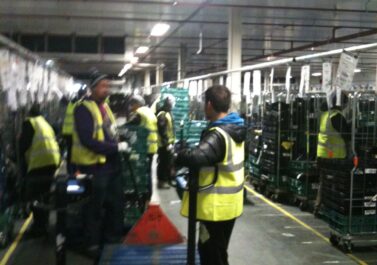A friend works as a maintenance engineer at Heathrow airport. You can read about working conditions and organising efforts below – a shorter version will be distributed to Heathrow workers in WorkersWildWest no.9. If you want to get involved in our modest organising efforts in and around Heathrow, drop us a line:
angryworkersworld@gmail.com
The recent terrorism charges against activists who tried to stop a deportation flight at Stansted airport [1] demonstrated the highly politicised character most protests have once they take place around airports. The protests are politically charged either because airports are national borders like in the case of the Stansted 15 or because they are seen as of major national interest, which explains, for example, the heavy police repression against the wildcat strikes of airport construction workers in Turkey this year, who walked out after over 50 construction workers died on the site since works began. [2] Heathrow and its extension is still a political point of conflict – the local working class population in places like Southall or Hounslow suffer most from the increased air and noise pollution, at the same time they depend on the (low paid) jobs at the airport and together with their 80,000 colleagues they keep the machine running. Currently 300 new airports are planned world-wide and we have seen protests against this in Greece, France (ZAD) and other places. Air travel is a global class issue: between 80 to 95 of the world population has never seen an aeroplane from the inside.
We want to support fellow workers who work in and around Heathrow – we distribute the newspaper at Heathrow itself, but also at airline caterers such as Gate Gourmet and Alpha LSG and to workers at connected warehouses. We make clear that we have to refuse the capitalist blackmail of ‘jobs vs. human and environmental damage’. We need a new society which allows us to take care of each other and nature – globally connected workers like those working in international transport will be crucial to bring this social transformation about.
———
For the last five years CBRE have had the contract to maintain British Airways property at Heathrow and Gatwick Airports. They employ about 130 of us including management. Some days at work it’s easy to think that we can achieve a great deal. Hold the bosses to account when they cross a line, work together to solve difficult problems and even extract a healthy dose of pride and dignity from a days graft. Other days looking at our general lack organization, trust and fairly regular infighting it’s easy to imagine that at some point our bubbles going to burst and our contracts, working conditions etc. are going to be drastically changed for the worse. And that we might not have the collective strength to resist it.
One of our more hopeful moments came when our management finally gave in and agreed to pay AP money again. AP money is a £100 a month payment that engineers would get after they completed the training required to carry out Appointed Person duties in one of three disciplines (HV electrical/Pressure systems/Confined spaces). Even though it is quite a large increase in responsibility and workload the payment had been denied to all new starters since CBRE took over from Emcor 5 years ago. But after a great deal of moaning and a collective refusal of all new starters to go on the course or carry out the duties for no money, to our managers credit they saw sense and reinstated the payment. By working together and refusing to accept things as they were, we had won.
We have also had a partial success regarding our permit system at work. A permit system is basically a management system ostensibly designed to make sure that any sub contractors working on site are safe to do so. It also covers staff or sub contractors working in high risk areas or on high risk equipment. It involves those needing to carry out work providing proof of site induction, proof of competency, a risk assessment and method statement of task to be carried out and any other relevant certifications and paperwork needed to carry out works. If all this information is present and correct a member of staff trained to write permits will write a “permit to work” at the proposed job site. Once the the work is completed, it is to be checked and the permit is to be signed off.
It never works like this. Our permit desk is chronically under staffed and nowhere near the amount of checks that need be done, are done. But hopefully that is a useful summary of what the theory is.
On two separate occasions, over a short period of time, company directors had come down to our permit desk and appeared to be trying to intimidate our permit team into writing permits that for health and safety reasons had been refused. In the face of threats of disciplinary action, on both occasions our members courageously stood their ground and refused to write the permits until their legitimate concerns had been addressed. On the first occasion we demanded an apology and got a half apology that we settled for. On the second we requested a meeting with H&S management to discuss the whole issue surrounding our overstretched permit system and after a little resistance, secured the meeting. At which we aired our grievances and in the weeks following continued the discussion which has now lead to them agreeing to employ more staff for our permit desk. Whether they will or not is still to be seen. But as things stand we have turned a negative situation into a more positive one through persistence and a faith that we were right.
There are many reasons why our workplace still manages to have some small successes and has not degraded to the same extent that other jobs have. In the recent period it’s partly because we’ve been employed to a company that for whatever reasons, has been relatively resistant to rocking the boat. We would probably have had far greater struggles in our workplace if a Carrillion or a Mitie, had taken over 5 years ago. CBRE have given pay rises, just high enough to ward off any great ill feeling in that regard. They have taken away payments and benefits but not things that affect everyone, directly. Therefore it’s avoided the danger of everyone being aggrieved at the same time. This is either because they are worried about our reaction if they were to annoy everyone at the same time or it’s because they genuinely care about us or possibly both. Leaving that aside there is still some things different about our workplace, that, over the long term, lends itself well to a general feeling of resistance. One is the fact that turn over on the shopfloor has always been quite low, meaning that people get confident in their roles and also get to know each other quite well. Because of how large and complex the buildings we look after are, management has, over the years, probably been reluctant to lose too many of the older hands, due to the amount of knowledge they have accumulated. Whereas turn over of management has been extremely high, leading to a strong feeling of us and them and an inability on the part of management to implement a great deal of wide ranging changes. Related to this is the great age range that exists at work. Until recently the majority of workers were over 50. Some have worked there for over 40 years. Many more for at least 10 years. As I said this leads to confidence in their roles and a sense of ownership that’s infectious to new starters. The older staff also bring with them stories of times when things were different. In some ways better, in others, not so much. But in regard to contracts, pensions, benefits and working conditions, almost always better. Older contracts are superior in regards to sick pay, holiday, pensions, life assurance, redundancy payments, entitlements to vehicles, enhanced payments for seniority (called TSE payment £1500) and the AP money mentioned above. The list goes on. The only thing that new contracts even nearly compete on, is overtime rates and basic salary. The older contracts provide a much clearer sense of security in the workers present and future. The new contracts provide the opposite. Average wage for a day worker is 31000 and for a shift worker 35000.
New starters and younger staff have mentors that not only remember when contracts were better, but still have good contracts. They work alongside people that have far superior contracts. It leads to a justified sense of injustice and begs the question, how did these contracts come into existence? And watching and listening to the way the older workers act and talk, its easy to draw the conclusion that it’s not by sitting back meekly and waiting for handouts. At some point long ago unionised workers fought for those contracts.
All this undoubtedly contributes to a generalised feeling that you don’t have to accept bullying or intimidation or always do things you don’t think are right or safe or fair. Hopefully, in time it well lay the groundwork for us to rebuild the type of union that won those contracts.
All is far from plain sailing though. Our relationships are not as strong as they could be or need to be. Very recently we’ve seen arguments within the workforce. And one huge falling out in particular. It’s horrible to see workmates at each others throats. Many of us spend almost as much time with each other as we do our family and friends. Watching us turn on one another can be quite depressing. Most, if not all, the bickering and back biting revolves around one thing. Money. In particular money accrued from overtime. It’s easy to say it’s greed, but even though compared to many other people in this country we are relatively privileged, most of us (everyone with a young family) would find it extremely hard to get by each month without overtime. Tempers flaring given these circumstances is understandable, if not inevitable. A short term solution would be to sort out a fair overtime rota that everyone agrees on. However medium to long term we’ve got to realise that our basic pay has to be a great deal higher. We need management begging us to do overtime, not us begging them. We still have engineers today that remember, many years ago now, engineers marching round our workplace with banners demanding management stop forcing overtime on them. Such a protest, in today’s world, is unthinkable. Too many of us, quite literally, depend on the overtime to get by.
Over the last couple of decades wages have not kept pace with inflation. And other payments, similar to the AP money, and inflation based increases that we used to get have been slowly chipped away. For the time being they’ve been replaced by overtime. This however, is a precarious position to be in. Overtime can be taken away at any time. It’s only a rubbish manager, a messy workplace dispute or a tender process away from being stripped away, leaving many of us high and dry. A much more secure position to be in is to have a high basic pay with lots of good contractual benefits. But as long as we are fighting each other we are incapable of building the kind of solidarity that would be needed to take the fight to a company and make this more secure position a reality. So we find ourselves in a bit of a vicious circle. It can be broken out of but it would mean lots of discussion about what we want and struggling together to achieve it.
We have had discussions about the third runway. The environmental argument does gain quite a lot of traction on a local level. A lot of worker’s that know or live in the local area can see the terrible effect it’s likely to have on air quality, noise and light pollution. However a lot of people are tempted by the argument for jobs at any cost. And a perceived increased job security for us. The wider issue of climate breakdown doesn’t have much of an effect on the discussion for most. But some people have an awareness of the contradiction entailed in our line of work. It’s hard to gauge support for the runway among the workforce. Especially been as there hasn’t been a very visible campaign against it. And a very visible highly funded campaign for the runway locally. If there was a good pro planet, pro jobs, anti runway union campaign a lot of people would be quite easily swayed. A lot of people just want job security and opportunities for their kin. Our system would have us believe we need to sell out our environment to achieve it but most people wouldn’t if they were given alternatives. I think the GMBs stance on fracking is the same sort of problem.
As a union we have no industrial relations with other airport staff, that I’m aware of at my level. Personally, I’m friendly with lots of the cleaners and catering staff and have always offered advice and encouraged them to join unions and have represented them or been a witness in meetings with management. We all talk to cleaners, security, aircraft engineers, caterers etc. about each others jobs but I’m not sure how often it ever occurs to anyone to work together to solve problems we might have. I don’t think the GMB does anything to encourage collaboration between job roles. I might be wrong, I’m not exactly in the loop when it comes to the union. From what I’ve seen and heard I think the officers of the GMB and Unite collaborate with each other on issues. I think the airport is pretty well split between both unions. Some of the older members talk about times years ago when different job roles would collaborate or bargain together. I haven’t managed to find ways of helping to bring this about my self yet, except for the small amount of stuff I’ve done with the cleaners and caterers.
Gatwick is a bit unknown to me. Years ago when I first started I heard about people coming from Gatwick to discuss union matters but all that has fallen by the way side. We did hear about one incident of a worker’s contract being attacked. He lost his pension and some other benefits on the some weird technicality. I don’t know how the company got away with it. I’d like to think there’s no way the company would dare single out anyone on our site like that and think they’d get away with it. Which suggest solidarity at Gatwick isn’t what it should be. There isn’t many left there now only about 7 or 8 engineers.
Many workplaces are in similar situations. In one way or another our work and home lives have been made more precarious. Most of us are more reliant on overtime or debt or charity to make ends meet. By sharing each others stories and turning our anger and frustrations away from each other and onto those that are causing and profiting from our situations, we can start to rekindle the widespread, but dormant idea, that we should all have a say in our daily lives.
[1]
http://libcom.org/news/out-control-home-office-should-have-been-dock-not-us-stansted-15-respond-guilty-verdict-101
[2]
https://en.labournet.tv/airport-construction-workers-protest-deadly-working-conditions-istanbul



